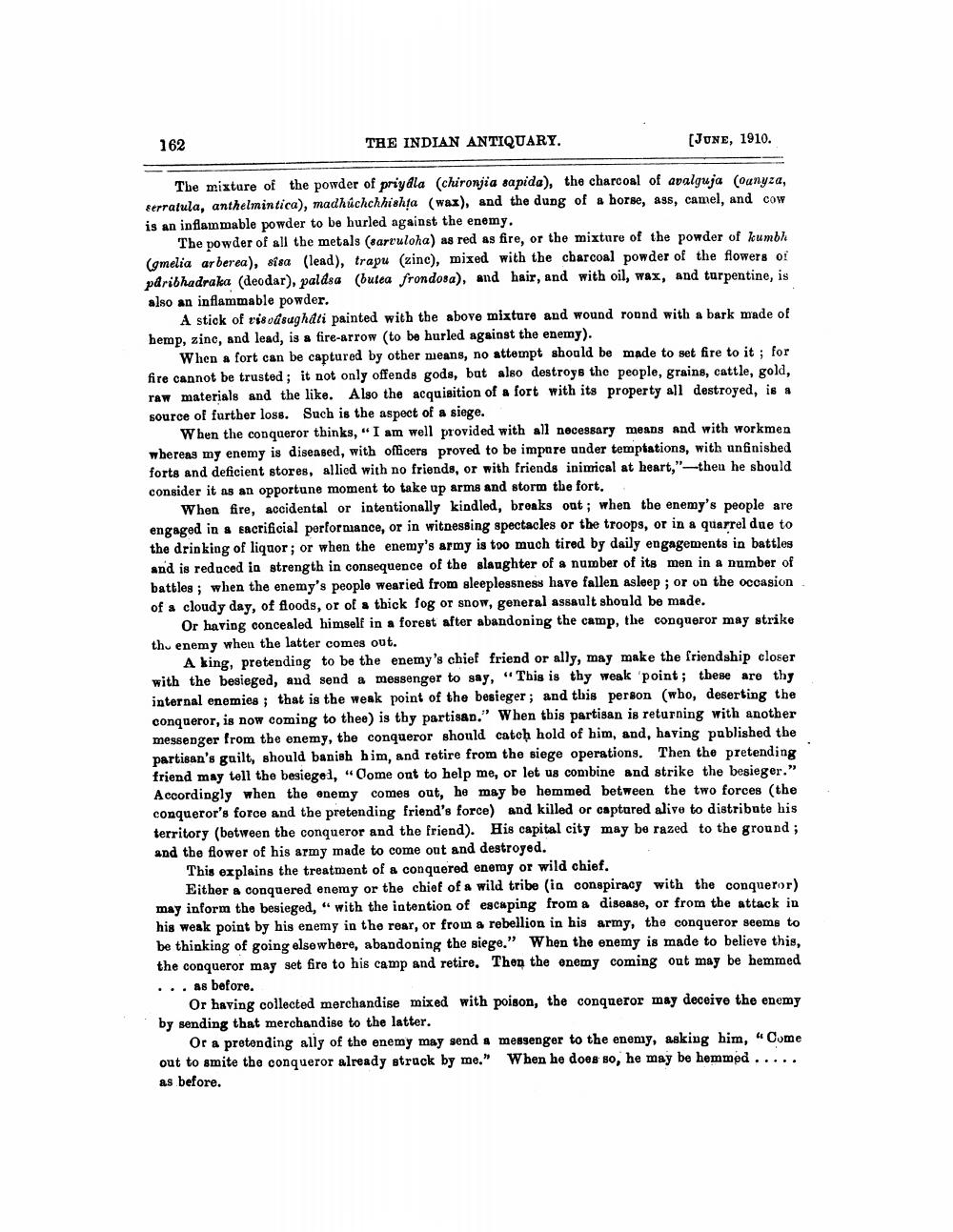________________
162
THE INDIAN ANTIQUARY.
(JUNE, 1910.
The mixture of the powder of priydla (chironjia sapida), the charcoal of avalguja (ounyza, serrafula, anthelmintica), madhúchchhishta (wax), and the dung of a horse, ass, camel, and cow is an inflammable powder to be hurled against the enemy.
The powder of all the metals (sarvuloha) as red as fire, or the mixture of the powder of kumbh (omelia ar berea), sisa (lead), trapu (zinc), mixed with the charcoal powder of the flowers of paribhadraka (deodar), paldsa (butea frondosa), and hair, and with oil, wax, and turpentine, is also an inflammable powder.
A stick of risoasughati painted with the above mixture and wound round with a bark made of hemp, zinc, and lead, is a fire-arrow (to be hurled against the enemy).
When a fort can be captured by other means, no attempt should be made to set fire to it ; for fire cannot be trusted; it not only offends gods, but also destroys the people, grains, cattle, gold, raw materials and the like. Also the acquisition of a fort with its property all destroyed, is a source of further loss. Such is the aspect of a siege.
When the conqueror thinks, "I am well provided with all necessary means and with workmen whereas my enemy is diseased, with officers proved to be impare under temptations, with unfinished forts and deficient stores, allied with no friends, or with friends inimical at heart," then he should consider it as an opportune moment to take up arms and storm the fort..
When fire, accidental or intentionally kindled, breaks out; when the enemy's people are engaged in a sacrificial performance, or in witnessing spectacles or the troops, or in a quarrel due to the drinking of liquor; or when the enemy's army is too much tired by daily engagements in battles and is reduced in strength in consequence of the slaughter of a number of its men in a number of battles; when the enemy's people wearied from sleeplessness have fallen asleep; or on the occasion of a cloudy day, of floods, or of a thick fog or snow, general assault should be made.
Or having concealed himself in a forest after abandoning the camp, the conqueror may strike thu enemy when the latter comes out.
A king, pretending to be the enemy's chief friend or ally, may make the friendship closer with the besieged, and send a messenger to say, "This is thy weak point; these are thy internal enemies; that is the weak point of the besieger; and this person (wbo, deserting the conqueror, is now coming to thee) is thy partisan." When this partisan is returning with another messenger from the enemy, the conqueror should cateḥ hold of him, and, having published the partisan's guilt, should banish him, and retire from the siege operations. Then the pretending friend may tell the besiegel, “Oome out to help me, or let us combine and strike the besieger." Accordingly when the enemy comes out, he may be hemmed between the two forces (the conqueror's force and the pretending friend's force) and killed or captared alive to distribute his territory (between the conqueror and the friend). His capital city may be razed to the ground; and the flower of his army made to come out and destroyed.
This explains the treatment of a conquered enemy or wild chief.
Either a conquered enemy or the chief of a wild tribe (ia conspiracy with the conqueror) may inform the besieged," with the intention of escaping from a disease, or from the attack in his weak point by his enemy in the rear, or from a rebellion in his army, the conqueror seems to be thinking of going elsewhere, abandoning the siege." When the enemy is made to believe this, the conqueror may set fire to his camp and retire. Then the enemy coming out may be hemmed ... as before
Or having collected merchandise mixed with poison, the conqueror may deceive the enemy by sending that merchandise to the latter.
Or a pretending ally of the enemy may send a messenger to the enemy, asking him, “Come out to smite the conqueror already struck by me." When he does so, he may be hemmod ..... as before.




